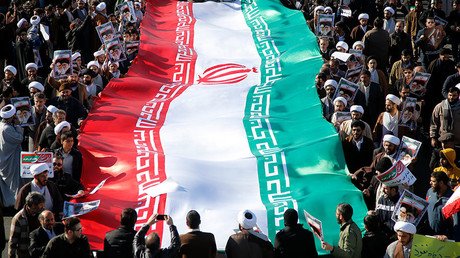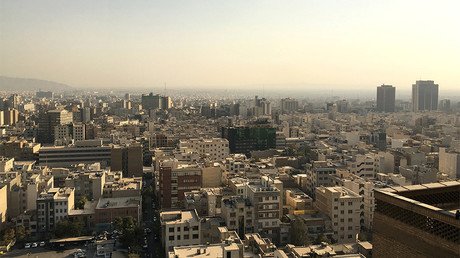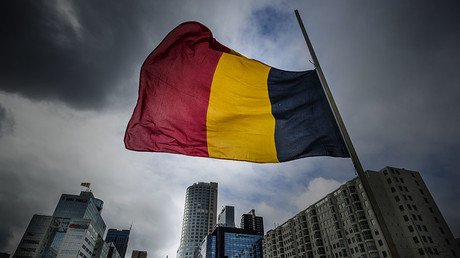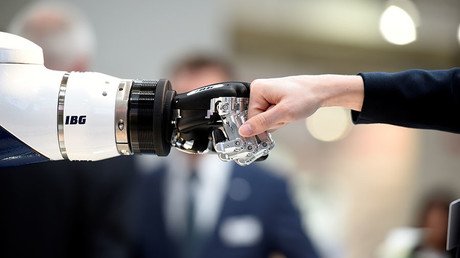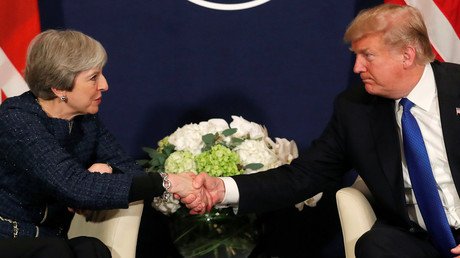'Trump's decision on Iran was a big stab to the JCPOA, but not a mortal blow'
After Donald Trump's announcement on Iran, the US diminished its credibility worldwide and weakened its hand in negotiations with North Korea, Kaveh Afrasiabi, author and former advisor to Iran's nuclear negotiating team told RT.
Trump's decision to withdraw from the Iranian nuclear deal has sparked a wave of protests in Tehran. Furious demonstrators burned the Stars and Stripes and photos of the US president. Iranian MPs also burned the US flag in parliament with vocal support from fellow lawmakers.
In his recent statement, the US president blamed Iran for "bedlam and death". He also vowed to re-impose the toughest sanctions on Tehran.
A day after Trump announced his decision, Israel fired rockets into the disputed Golan Heights, targeting Iranian outposts. Earlier, Tel Aviv blamed Iranian Revolutionary Guard Corp's Quds Forces of attacking its positions in the area.
RT: Do you expect the deal to stay in place just without the US, if other the signatories and Iran itself, want to keep it?
Kaveh Afrasiabi: I really think that [the deal] has a very good chance of surviving Trump's big acts. I am very happy to see firm responses by, among others, Federica Mogherini, the EU's foreign policy chief – who reminded Trump that this is an international agreement that is backed by international law and can't be unilaterally abrogated. Another important voice in support of this has been the UN Secretary-General Guterres who has called on all the EU member-states to abide by their obligations because this agreement has been endorsed by the UN Security Council resolution 2231.
Given the firm denunciation by Russia and China as well, and the joint statement by the UK, Germany and France in support of the JCPOA, I will put the bet on behalf of the preservation of the JCPOA. Hopefully in the coming discussions between Iran and these parties, we will get much clearer about this. I am cautiously optimistic that JCPOA will survive in the foreseeable future.
RT: Reports have been emerging that Iran is preparing a list of retaliatory measures. What are they likely to be?
KA: Iran has taken a whole array of obligations under this agreement, including transparency measures allowing tremendous access to international inspectors well beyond its obligations under the normal IAEA protocol. And curtailing the inspections might be one option for Iran to send the very clear signal not just to the US but also to the Europeans ... And let's be very clear about that: Trump did not only simply exit the JCPOA, he violated the US's written obligations under the term. That is very delicate and important point that has been raised by Mogherini and others. This might go to the International Court of Justice and other legal forms, the UN Security Council. The battle is not over yet, over the US's position with respect to the JCPOA. And I foresee a lot of follow-up actions in Europe and elsewhere.
But in addition to that, Iran might resolve full-scale nuclear work and President Rouhani has instructed the atomic organization to prepare the ground work for resumption of 20 percent enrichment and even perhaps higher. Iran definitely has the will to resist, will not be bullied by this Western superpower that is trying to impose its will on other nations arbitrarily without any qualm about international law and principles.
And this has clearly backfired against Trump both at home, where two thirds of American voters are in favor of the JCPOA, and given the fact that there is a strong consensus in support of this deal in the international community…Therefore, Trump will face severe backlashes at home and internationally. And I hope that the critics at home will keep pressing Trump to reconsider his unwise and regrettable decision that is counter to the US own national interest. Because one of the immediate casualties of this has been $16 billion contract for Boeing.
Contrary to the Paris Climate Agreement or other agreements that the Trump administration has exited from, this is an agreement that Trump has now gone further by re-imposing the lifted sanctions. If the Europeans want to maintain their faithfulness to the deal, that means that they have to abide by Section 26 of the JCPOA, that commits these states "to prevent interference with the realization of the full benefits by Iran of the sanctions lifting."
Or Section 22 that allows the sale of commercial airplanes and parts to Iran. And we have seen just yesterday, immediately after Trump's announcement, attempts by the Treasury department to ban the sale of commercial aircrafts to Iran. Or tweet by the US Ambassador in Germany warning German companies to withdraw from the Iranian market. Those are all [examples of] interference in the Iranian trade that violate the terms of the JCPOA. And if the European Three and other European countries want to be faithful to the JCPOA, they have to implement these very specific provisions of the agreement which mean in essence standing up to Uncle Sam and saying a big 'NO' to it.
RT: Trump's decision to scrap the Iran deal came just ahead of his meeting with North Korea's leader Kim Jong-un. Will North Korea trust the US after Trump's already broken one nuclear agreement?
KA: I really think that the decision by Trump to withdraw was a big stab at the JCPOA, although it is not quite a mortal blow. And it diminishes US' credibility worldwide just, as a number of US pundits and former officials, including former Secretary of State John Kerry and former president Barack Obama have explicitly stated. And therefore the US' hand in the negotiations with North Korea has potentially weakened...
Think your friends would be interested? Share this story!
